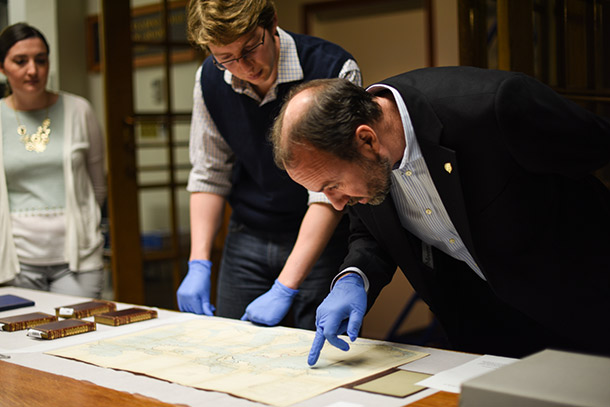Also in this Tyee Presents series:
CONTEST: Enjoy an Arctic Evening with the Vancouver Maritime MuseumIn May 1845, Sir John Franklin and his crew set sail for the Canadian Arctic, in what was then considered the final push to discover the fabled Northwest Passage. The crew were veteran explorers, and their two ships, HMS Erebus and HMS Terror, were amply provisioned and outfitted with the most modern marine technology of the day.
They never returned.
The search for Franklin's expedition -- the largest rescue effort in recorded history -- was a monumental effort, involving hundreds of ships and thousands of men. It inspired books, songs, plays and artwork, and ultimately led to the discovery and navigation of the long-sought trade route.
Now, 170 years later, the Vancouver Maritime Museum has undertaken a monumental effort of its own with the May 9 launch of "Across the Top of the World: The Quest for the Northwest Passage," a comprehensive exhibit exploring not only Franklin's final voyage, but the 400-year international attempt to discover the Northwest Passage itself.
"What a testament to human survival in a barren and unforgiving land," said Ken Burton, the museum's executive director. "The trials and tribulations that people went through to find the passage -- generations of explorers. It's the story of ordinary people rendered heroic at the top of the world. It's the story of amazing Inuit survival."
The exhibit fills four different rooms, each exploring different aspects of the search, from the various explorers and their voyages of discovery, to the search for Franklin and the eventual discovery of the passage -- an oceanic shortcut from the Atlantic to the Pacific across the top of North America.
The exhibit is set to include artwork, tools, photographs, a variety of rare historical documents and a navigator's desk with charts.
"Beyond the resources, and beyond the interest in geography or politics, [the quest] also tells us a lot about who we are as Canadians," Burton said. "Canada's far more than just 30 million people living along the 49th parallel. We're all part of a greater landmass, and we need to learn more about it."
A push in all directions
The new exhibit is nearly 20 years in the making. Research began in the late 1990s by then-museum director James Delgado, and while an original exhibit proposal was shelved, Delgado's research eventually became a book.
The remaining research and artifacts waited in storage for close to 15 years, until the recent discovery of HMS Erebus in the waters of Queen Maud Gulf. The find, which may well yield crucial details about the lost Franklin expedition, is one of the most significant in Canadian maritime history and is explored in depth over the course of the new exhibit.
A 40-year veteran of underwater exploration, Delgado was happy to see the exhibit finally realized. "We kept the files, and it waited for a better day, and that better day came thanks to Ken Burton and his exceptional team. And given renewed interest -- particularly with the discovery of both [the HMS] Investigator and now [the HMS] Erebus -- it's the perfect exhibit to mount."
The Vancouver Maritime Museum is the only public institution in the country that tells the story of Canada's maritime endeavours in the Arctic, said Delgado. "There are incredible artifacts in their collection. It's an ideal exhibit for the Maritime Museum, and one that I think is going to be truly world class."
The museum has always had strong ties to Canada's Arctic history, not only as the resting place of the St. Roch -- the second vessel to ever navigate the Northwest Passage -- but as a repository for a number of rare items related to Franklin's voyages, including a copy of the Northwest Passage Act, the piece of British legislation which started the search in earnest.
"In 1744, British Parliament offered $20,000 payable to the person or persons who successfully transited the Northwest Passage," Burton said. "There are about 26 acts of British Parliament that initiated the big Age of Exploration -- the James Cook and Vancouver voyages, and certainly aided in a lot of the Arctic exploration. Because people wanted not only the notoriety, but $20,000 in 1744 -- that was a King's Ransom."
The quest for the passage was one of the longest searches in the history of human exploration -- one of "great triumph and tragedy," Delgado said.
"It's a story that deserves to be looked at again, and reintroduced. You also have what ultimately all great quests do: in searching for the Northwest Passage, and mapping the Arctic Archipelago, those explorers helped us better map the human heart." ![]()
This article is part of a Tyee Presents initiative. Tyee Presents is the special sponsored content section within The Tyee where we highlight contests, events and other initiatives that are either put on by us or by our select partners. The Tyee does not and cannot vouch for or endorse products advertised on The Tyee. We choose our partners carefully and consciously, to fit with The Tyee’s reputation as B.C.’s Home for News, Culture and Solutions. Learn more about Tyee Presents here.


















Tyee Commenting Guidelines
Comments that violate guidelines risk being deleted, and violations may result in a temporary or permanent user ban. Maintain the spirit of good conversation to stay in the discussion.
*Please note The Tyee is not a forum for spreading misinformation about COVID-19, denying its existence or minimizing its risk to public health.
Do:
Do not: